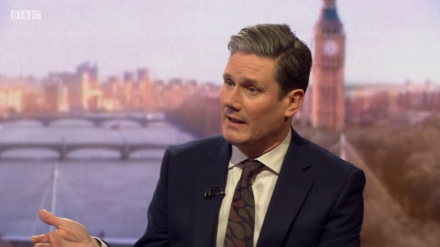
For two months neither the Conservatives nor Labour said anything new about Brexit, as the dust settled on December’s stage one agreement. Now, in the last five days, both parties have developed their positions significantly. It is a case of move and counter-move. The details have already been well-trailed but Jeremy Corbyn’s speech today – and Theresa May’s later in the week – are still highly significant.
The Conservatives will say they want a ‘three buckets’ approach – so that the UK will follow EU regulation in some areas, pursue the same goals by different means in others, and diverge entirely with a final group. The ability to strike independent trade deals will be a red-line, ruling out a comprehensive customs union.
It sounds new, but this pitch simply puts meat on the bones of the position that Theresa May set out in her Lancaster House speech a year ago. She wants more than a conventional trade agreement but less than a single customs zone or internal market.
May is pursuing this course because it is the only path that can hold the Tories together. That is no surprise, as every step in Britain’s disastrous journey towards Brexit has been driven by the internal dynamics of the Conservative Party, not the needs or priorities of the British people.
In principle her ‘goldilocks’ Brexit – neither too distant nor too close – could attract broad public and business support. The problem is that it is not remotely possible, as wiser Tories know. By presenting it as the UK’s considered opening bid for the Brexit end-game, the Conservatives are burning credibility and wasting time.
The ‘three buckets’ plan can’t work for two reasons – one to do with politics, the other with real-world facts. First the plan will be totally unacceptable to the rest of the EU. It epitomises ‘have your cake and eat it’ – all the benefits of the EU with none of the burdens. From the EU’s perspective the UK will have to be ‘further in’ or ‘further out’, as comrades from sister parties around Europe will tell any Labour politician who cares to ask.
Second – and just as importantly – it is next to impossible to see how the May plan could in practice achieve its goals of seamless supply-chains, regulatory equivalence for services and a fully open Irish border. In particular, no Tory politician has explained how their model is compatible with a porous border and therefore peace in Northern Ireland.
Added to that the Conservatives maintain the preposterous fiction that the whole deal can be agreed and implemented within three years. It is a sign of how far down the rabbit-hole the government has fallen that even sensible Tory Remainers don’t contest this point in public.
May has settled her internal party problems by forbidding reality from intruding and kicking the can down the road – again. By contrast, Labour’s new position is good economics and good politics, giving the party the upper hand.
When it comes to economics, a customs union is probably the minimum that a post-Brexit Britain will need to stop trucks from tailing-back at Dover or Newry.
As for the politics, this is an issue where Labour can combine with a decent slice of Remain-leaning Conservatives to make a government defeat in the House of Commons look possible. But more importantly, the position works within the Labour family because the question of a customs union does not divide Labour’s own electoral tribes – which means that only a tiny hard-core of Labour Leave campaigners will defy the party whip.
Labour MPs in leave-leaning seats know there aren’t many voters in Doncaster or Stoke who voted Brexit because they yearned for the right to strike free-trade deals as a sovereign nation state. And it is also manufacturing heartlands that stand to lose the most without tariff-free, frictionless trade in goods with Europe. As long as Labour MPs can show that their support for a customs union is in aid of a Brexit that works, rather than no Brexit at all, they can avoid accusations of betrayal.
It is much harder to square the instincts of Labour leave voters with membership of the single market, or any near equivalent. Deep market integration must mean permanent budget contributions, “rule-taking” and far-reaching oversight from the European court of justice. Crucially, it will also mean free movement of people on something close to current terms.
The Labour frontbench may ultimately argue for a ‘Norway’ Brexit on EEA terms. But this will only happen if or when it is clear that no less-integrationist alternative is feasible – and when a sizeable portion of Leave voters have changed their minds to the extent that they are prepared to accept the price of soft Brexit.
Neither of those conditions applies today, which is why the Labour centre-of-gravity has not united behind the single market option. In fact it suits the Labour frontbench to be sandwiched between the single-market out-riders on its own backbenchers and the government’s impossible-ist ‘goldilocks’ position.
Backing a customs union and not the single market may not be Labour’s final line on Brexit – but it is a good one for now.
Andrew Harrop is general secretary of the Fabian Society.




More from LabourList
Supreme Court trans ruling: Ban on CLPs and branches backing ‘unlawful position’
‘How we can build a strong political centre and centre-left’
‘Building the UK’s best network: delivering digital opportunity for every community’